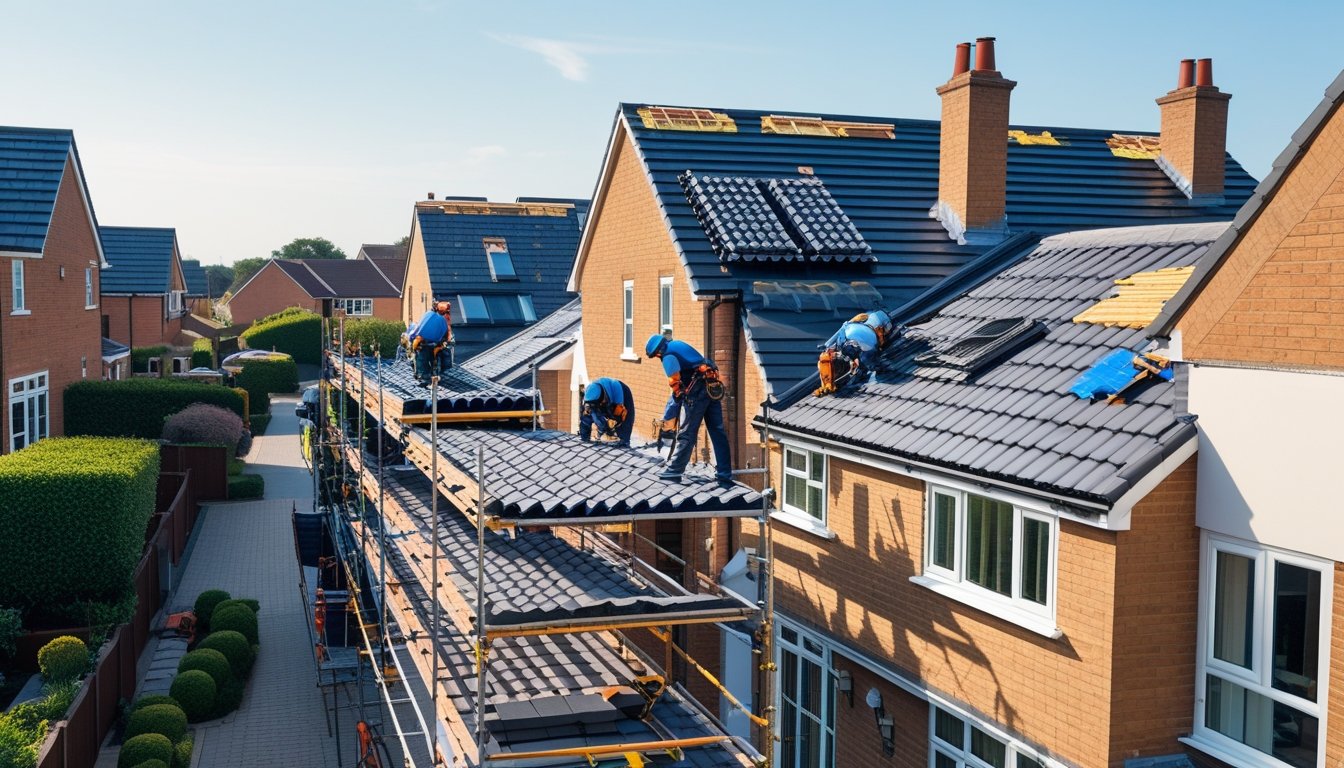Late updated: 23 Aug 2025 13:08
Written by: Oliver Bennett
Navigating UK Roof Renovation Grants and Funding Options: A Comprehensive Guide
Renovating a roof in the UK can be a significant investment, but the good news is that there are financial assistance options available to help homeowners. Grants and funding can ease the financial burden associated with such improvements. Finding the right grant involves understanding what's available, the specific eligibility criteria, and how to effectively apply for them.

Homeowners have various grant types to consider, such as government-funded grants that are distributed through local authorities or housing associations. Exploring these options can reveal opportunities to cover repair, replacement, or insulation costs. By tapping into these resources, we can potentially offset some of the costs and gain significant financial relief when carrying out necessary home improvements.
Navigating the landscape of UK roof renovation funding can initially seem daunting, but it is achievable with the right guidance and information. In our article, we explore not only grants but also additional funding options and cost considerations. Armed with this knowledge, we are better equipped to make informed decisions for our homes.
Key Takeaways
- Grants can help offset roof renovation costs in the UK.
- Various funding options are available through local authorities or associations.
- Understanding eligibility and application processes is crucial.
UK Roof Renovation Grants: Types, Eligibility, and Application

Roof renovation grants in the UK are an essential resource for homeowners looking to maintain or upgrade their roofs. These grants come in various forms, each with specific benefits and requirements. Homeowners must meet eligibility criteria and follow a detailed application process to take full advantage.
Types of Roof Grants and Funding Schemes
There are several types of grants available for roof renovations. Government grants are often aimed at improving energy efficiency and may include installing insulation or using sustainable materials. Roof repair grants help with essential maintenance, while home improvement grants can cover a broader range of upgrades, from solar panel installation to double-glazing windows.
Energy efficiency grants are designed to encourage eco-friendly upgrades. Some local councils also offer specific grants to address particular community needs.
Eligibility Criteria for Roof Renovation Grants
Eligibility criteria vary widely between different grant types. Income level is a common factor, with many schemes aimed at low-income households. Properties may also need to meet certain conditions, such as being the primary residence or listed in specific council areas.
Applicants may need to provide proof of ownership or residency status. Some grants are only available for specific property types, like older homes needing urgent repairs. It’s crucial to check each grant’s specific eligibility requirements before applying.
Application Process for Government and Local Council Grants
Applying for these grants typically involves several steps. Initial research to identify suitable grants is essential. Most applications require detailed documentation. This often includes proof of income, property ownership, and sometimes quotes for the renovation work.
Government and local council grants may have different application procedures, often involving an online form. It is advisable to contact local councils directly for guidance, as they can provide specific advice based on individual circumstances. Accurate and timely submission of all required documents is vital to increase the chances of approval.
Exploring Additional Funding Options and Cost Factors
When considering roof renovation in the UK, it's essential to understand the various funding options beyond government grants. By exploring home improvement loans, estimating costs, and considering energy-efficient materials, we can make informed decisions that might reduce financial burden.
Home Improvement Loans and Alternative Finance
Home improvement loans present a viable option for covering roofing costs when savings and grants fall short. We can obtain these loans from traditional banks or specialised lenders offering tailored finance solutions for home renovations. Interest rates and terms can vary, so it's beneficial to shop around and compare loan options.
Alternative finance options include credit unions, which might cater to local community needs with potentially more favourable terms. Additionally, credit cards could also be considered, although their high-interest rates could make this an expensive route. Engaging with a financial advisor could help navigate these choices, ensuring the most suitable financing path aligns with our specific circumstances.
Estimating Roof Repair and Replacement Costs
Estimating roof repair or replacement costs is essential for budget planning. Variables such as the size of the roof, the materials chosen, and the complexity of the installation can significantly influence costs. On average, roof repairs in the UK range from £300 to £1,000, while complete roof replacement can start from £5,000.
We should consider hidden costs such as scaffolding, disposal of old materials, and urgent repairs that might arise during the project. Obtaining multiple quotes from reputable contractors will allow us to understand market trends and secure competitive pricing. Regular maintenance can also reduce long-term costs, highlighting the importance of periodic inspections to address minor issues before they escalate.
Energy-Efficient Roofing Materials and Upgrades
Energy efficiency is becoming increasingly relevant in roofing projects. Options such as solar panels, insulation improvements, and reflective coatings can enhance the energy efficiency of our homes. These materials not only reduce energy bills but may also qualify us for specific grants or tax incentives.
The initial investment in energy-efficient roofing might be higher, but the long-term savings in energy consumption and the increased value of our property can be worthwhile. We must consider both upfront costs and potential savings when evaluating these materials, thereby ensuring our investments contribute positively to both our finances and the environment.
Frequently Asked Questions

To navigate the options available for UK roof renovation grants and funding, it's essential to understand the criteria, application processes, and specific grants tailored to various needs. We address some pertinent questions to assist homeowners in pursuing financial assistance options.
What are the eligibility criteria for government roofing grants for pensioners in the UK?
Pensioners in the UK may qualify for roofing grants due to their age and income levels. Eligibility often depends on receiving certain benefits such as pension credit. It's crucial to consult local councils or government resources for the most current eligibility requirements.
How can one apply for a government grant for roof replacement?
Applying for a roof replacement grant involves submitting a completed application form, usually found on local council or central government websites. Documentation such as proof of home ownership and income may be required. We recommend contacting your local authority for specific guidance and requirements.
Are there specific roofing grants available for individuals with disabilities?
Yes, there are grants specifically designed for individuals with disabilities. These often focus on home adaptations to ensure safety and accessibility. It's wise to consult agencies like the Disabled Facilities Grant for more information on eligibility and the application process.
What assistance is available for low-income households requiring home repair grants?
Low-income households can access several funding options, including local council grants and national schemes. Programmes such as the Home Repair Assistance offer financial aid to cover essential repairs, which may include roofing. Eligibility is typically based on income levels.
How can one access green roof funding options in the UK?
Green roof funding options are available for those looking to improve energy efficiency. Grants may cover installation, insulation, or upgrades to eco-friendly materials. We encourage engaging with programmes like the Green Homes Grant, which require meeting specific energy-saving criteria.
What are the steps to obtain a home improvement grant for disabled residents?
The process starts with assessing the need for modifications and contacting local councils for a Disabled Facilities Grant application. You'll need evidence of disability and a detailed proposal for the required adaptations. The application process involves an assessment to determine the suitability and necessity of the proposed changes.
